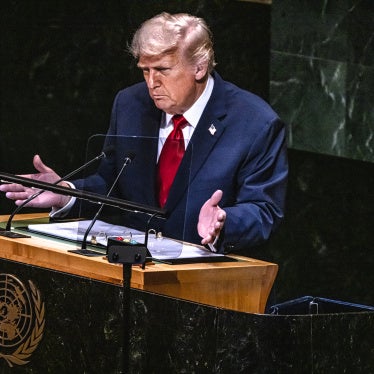The United States should allow U.N. human rights monitors, including the special rapporteur on torture, to visit detainees held at Guantánamo Bay.
Cuba late last week put forward a resolution at the U.N. Commission on Human Rights demanding such access for the rights monitor. Cuba should permit the U.N. rapporteurs to visit detainees in its own prisons as well.
“The international community should get commitments from both the United States and Cuba to grant U.N. investigators access to detainees on all parts of the island,” said Kenneth Roth, executive director of Human Rights Watch. “The European Union put its weight behind this effort.”
For several weeks, Human Rights Watch has urged the European Union to lead discussions at the Commission on providing access for the special rapporteurs to terrorism detainees in Guantánamo Bay.
More than three years after the first detainees were brought to Guantánamo, the U.S. government continues to detain nearly 550 people indefinitely without charge or trial and without applying the Geneva Conventions. There is growing evidence that detainees at Guantánamo have suffered torture and cruel, inhuman, or degrading treatment, in violation of the conventions as well as human rights treaties that the U.S. government has ratified.
Accounts by U.S. Federal Bureau of Investigation (FBI) agents who witnessed detainee abuse—including forcing chained detainees to sit in their own excrement–have recently emerged. Former Guantánamo detainees have described the use of painful stress positions, prolonged solitary confinement, the use of military dogs to threaten detainees, threats of torture and death, and prolonged exposure to extremes of heat, cold, and noise. The International Committee of the Red Cross reportedly told the U.S. government in a confidential report that some abuses of detainees were “tantamount to torture.”
Since 2002, the U.N. Working Group on Arbitrary Detention has sought to visit Guantánamo. In June, the Working Group reiterated its request to visit those persons detained at Guantánamo Bay by the United States on grounds of terrorism, as well as in Iraq and in Afghanistan. Its request was joined by the special rapporteur on torture, the special rapporteur on the independence of judges and lawyers, and the special rapporteur on the right to health.
On April 1, the U.S. special ambassador for war crimes, Pierre Prosper, met with the U.N. investigators to listen to their pending request. But the United States has not made any public decision regarding the working group’s renewed request.
Cuba, which has repeatedly urged visits by U.N. monitors to the U.S. base at Guantánamo Bay, has a very poor record of granting access to U.N. monitors to its own territory. In the last decade, it has granted access to the country only to the special rapporteurs on mercenaries and on violence against women. In addition, working with countries such as China, Egypt, and Malaysia, Cuba has consistently worked to undermine the independence and work of such U.N. investigative mechanisms.
In April 2003, Cuban authorities sentenced 75 dissidents to prison terms ranging from six to 28 years; all but 14—released last year for humanitarian reasons—remain incarcerated. Prisoners are generally kept in abusive conditions, often in overcrowded cells. Some also endure physical and sexual abuse, typically by other inmates with the acquiescence of guards. Political prisoners who denounce poor conditions of imprisonment or who otherwise fail to observe prison rules are frequently punished by long periods in punitive isolation cells, restrictions on visits, or denial of medical treatment.






